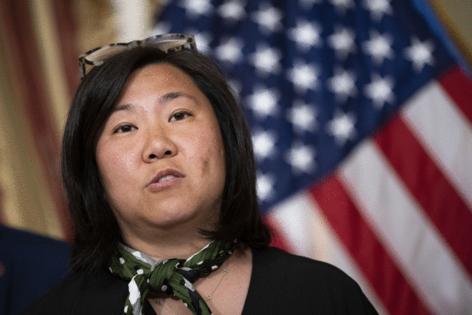House, Senate panels differ on future of hate crime grants
Published in Political News
WASHINGTON — House and Senate appropriators are divided in their fiscal 2026 spending bills on whether to zero out funding for grants authorized under two laws focused on addressing hate crimes.
The Trump administration, in its budget request, proposed cutting all funding for grants authorized under the Matthew Shepard and James Byrd, Jr. Hate Crimes Prevention Act and the Jabara-Heyer NO HATE Act.
A Republican-controlled House appropriations subcommittee stuck with White House’s request, approving a Commerce-Justice-Science spending bill last week that would provide no money for grants authorized under those acts.
Senate appropriators took a different approach. Their version of the bill would keep the appropriated funding level in fiscal 2026, with $17 million going to grants authorized under the Shepard-Byrd law and $9 million for grants under the Jabara-Heyer NO HATE Act.
The Justice Department’s budget summary did not provide a specific reason for its request to zero out the grant money. But a White House document said their budget request proposes the elimination of grant programs “that are duplicative, not aligned with the president’s priorities, fail to reduce violent crime, or are weaponized against the American people.”
On Capitol Hill, the push to go after hate crime prevention grants has drawn criticism from some Democrats.
Rep. Grace Meng of New York, the top Democrat on the House Commerce-Justice-Science appropriations subcommittee, said the push to zero out the grant money was “outrageous” and would hurt communities.
“I don’t know why they’re targeting these bills, these programs, in a time when hate crimes are going up against many of our communities, whether it’s anti-Asian hate crimes, whether it’s anti-semitism,” she said.
Meng noted that the Senate included funding in its bill.
“That’s a slightly positive sign for us,” she said.
The office of Rep. Harold Rogers, R-Ky., a longtime appropriator who leads the House subcommittee, did not respond to a request for comment on why the House bill proposes to zero out that grant money.
The Shepard-Byrd law bears the names of two men who were killed in high-profile hate crimes that shocked the nation in the late 1990s: Matthew Shepard, a gay university student who died after being beaten and left to die in a remote area in Wyoming, and James Byrd Jr., a Black man who was dragged to death in east Texas.
The grants aim to help authorities investigate and prosecute hate crimes. For example in Oregon, a district attorney’s office said grant money would allow them to support victim advocate positions focused on serving bias-crime victims.
In Florida, a local sheriff’s office reported that grant money would go to its targeted violence prevention program, an expansion that would include software, training and new technology to improve the agency’s ability to monitor and report potential hate crimes and targeted violence.
The other law, the Jabara-Heyer NO HATE Act, was approved by Congress in 2021 as part of the COVID-19 Hate Crimes Act, which passed with wide bipartisan support.
The law is named after Khalid Jabara, a man who was killed by a neighbor who had terrorized his Lebanese family, and Heather Heyer, who died after a vehicle slammed into a crowd of people counterprotesting the “Unite the Right” rally in Charlottesville, Va.
The law in part authorizes grants to states for hate crime reporting hotlines.
Victoria Jabara, president and co-founder of the Khalid Jabara Foundation, said her group has seen firsthand how the law has helped communities and noted that addressing hate crimes should be everyone’s priority.
“We feel strongly that the best way to prevent hate crimes is through education and awareness,” she said in an interview after the White House request. “And the bill, the Jabara-Heyer No HATE Act bill, really helps incentivize those communities and law enforcement to get mobilized, to be able to help, again, with those prevention efforts.”
©2025 CQ-Roll Call, Inc., All Rights Reserved. Visit cqrollcall.com. Distributed by Tribune Content Agency, LLC.

























































Comments